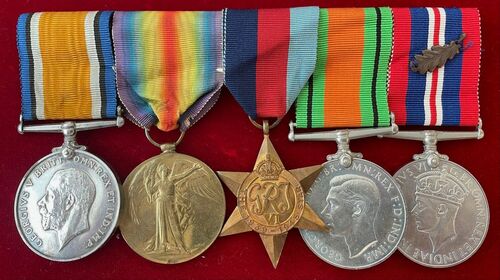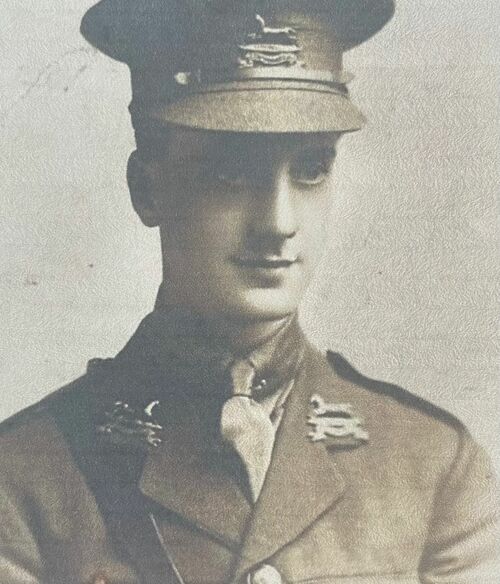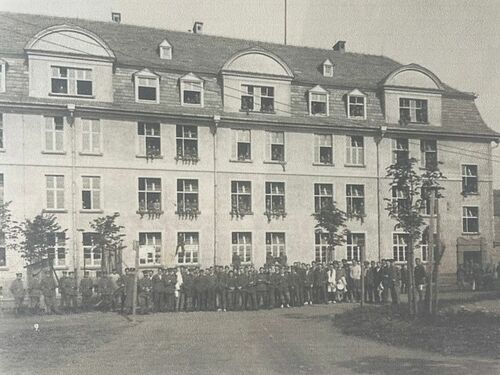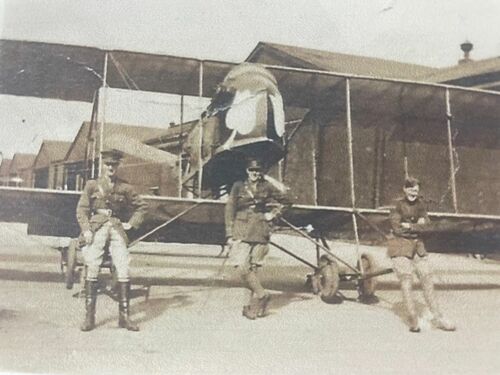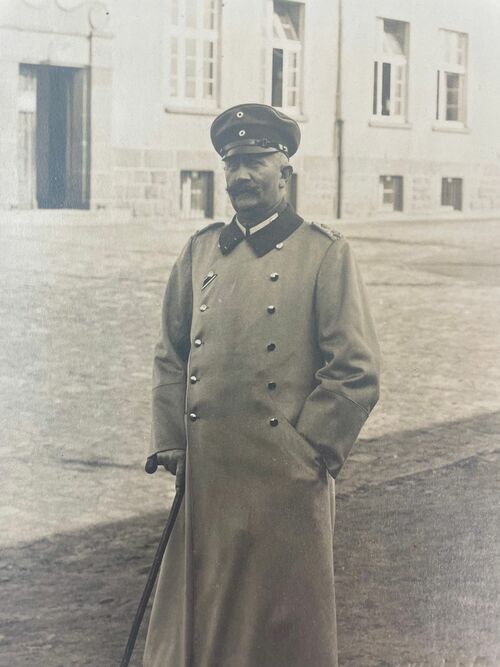Auction: 23112 - Orders, Decorations and Medals - e-Auction
Lot: 578A
The outstanding campaign group of five awarded to Lieutenant H. V. Caunt, Royal Flying Corps and Royal Air Force, who was shot down whilst flying with No. 67 Squadron, he was entertained by the Red Baron before going 'in the bag' and left a remarkable account of his Great War in the form of his autobiography
Caunt became a Prisoner of War at Holzminden Camp and became a key Member of the Escape Committee, it became the scene of the sensational 'first Great Escape', when the plucky party emerged from the tunnel at in the summer of 1918; he returned to the fold during the Second World War and earned himself a 'mention'
British War and Victory Medals (Lieut. H. V. Caunt. R.A.F.), official correction to the surname on first; 1939-45 Star; Defence and War Medals 1939-45, with M.I.D oak leaves, mounted as worn, good very fine (5)
The story of Horace Vernon Caunt is best told in an article by The Yorkshire Post under the title 'Escape to victory: The lost war of Horace Caunt':
'It is a detail of history seldom recorded – rendered inconsequential by the enormity of the tragedy unfolding across Europe.
But a century on, the journal of a pioneer pilot in the Royal Flying Corps evokes a lost world of derring-do, bravery and sacrifice on both an epic and a personal scale.
The 52-page manuscript handwritten in the 1930s by Horace Caunt, a lieutenant from Leeds, is also an intense personal drama of incarceration in - and attempts to escape from - a German PoW camp.
Its discovery, among family papers, has come almost exactly 100 years since 29 of his comrades crawled out of Holzminden in a tunnel he had helped them dig by hand. Never formally published and unseen for generations, Lt Caunt's autobiography adds a new layer of intimacy to the commemoration in this centenary year of the greatest conflict man had known.
That Lt Caunt's name is not better known is as he would have wished it, for as he wrote:
"What happened during those four years happened to so many thousands of others so exactly, that I seek neither praise for my doings nor individuality for my story."
Rather, he said, his was the story of others - "brave, unselfish men who by their example of courage and cheerfulness revived the spirits of others less brave but who since have crossed the border, never to return in body but who remain in spirit, never to be forgotten".
Horace Caunt had been born in March 1895 in Dewsbury, one of six children, to a local bank manager. In 1915, he joined the 13th Battalion, Prince of Wales Own West Yorkshire Regiment. It stayed in reserve in England for two years so in 2017 he applied and transferred to the Royal Flying Corps, forerunner to the RAF, to train as a fighter pilot.
Posted to Doncaster, he found the racecourse transformed into an aerodrome, and describes what he saw.
"I made for the hangers to see the aircraft and what marvellous machines I thought they were, Maurice Farman Shorthorns, built of bamboo struts and piano wire, they looked like huge box kites with the propeller at the back to push them into flight. Although they would be seen to be comical these days, then, we were quite willing to risk our young lives in them. They used to take off after a long run and clatter across the sky at about seventy miles per hour, do a circuit or two and come in to land on two wheels. They were fondly referred to as 'Rumpetys'."
Lt Caunt was then ordered to Beverley, whose racecourse had also been commandeered, for instruction in advanced flying, bombing techniques, photography and signals.
"After our daily courses we were allowed to fly freely so we generally made straight for the seaside town of Bridlington to buzz the pier and anyone on it, but after complaints from an irate town council, and an old lady who had been prostrated with shock, flying over the town was restricted to below two thousand feet."
He then describes what must have been one of the earliest aerial views of Leeds and the surrounding towns.
"I ran into a terrific hail storm and received the most painful buffeting of my life, but as I was beginning to really get worried - as the storm whirled the plane about like a leaf in the wind - we flew out into brilliant sunshine.
"Espying Leeds in the distance I landed in Tadcaster to find the propellers had been very badly chipped by impact with large hailstones. They had to be changed before my return to Beverley. Next day my CO informed me I was now fully qualified as a pilot and could now wear wings. He also added that this was about as near as I would get to being an angel."
That November, he went to the front in France at Popringhe airfield, near Ypres. He shot down at least three enemy planes during the next month, but his mood darkened after one sortie, when he returned and looked in vain for a comrade he identifies only by his nickname, Tiny.
"Exhausted and very subdued I heaved myself out of the cockpit and went to look for Tiny, but my heart sank when I heard it was reported that he had failed to return.
"To help pass the time I counted the bullet holes in my machine, giving up the task when I reached 40. After waiting an hour I was forced to conclude that he was down, but that there was still hope he may be down on our side of the lines. The confirmation of my second Hun was poor consolation for the loss of my friend. Suddenly there was a void somewhere and nothing could fill his empty chair in the mess. Next morning I went through his kit and packed it ready to be sent home to his parents."
His spirits dropped further when he crashlanded and was taken prisoner, an experience he describes in detail.
"Just past Ypres we spotted a Hun two-seater at work, so getting well above with the sun behind, I waggled my wings to warn the flight to watch my tail, and then dived down in pursuit. At 50 yards I gave him full fire from my guns, he crumpled up in his cockpit, my speed swept me past and under the Hun and zooming up I prepared to dive again, but saw the German aircraft spinning for the ground. Foolishly I followed him down, to see the machine crash into a wood. This seemed to signal machine guns on the ground to open up. I was only about 200 feet up and could see the tracer bullets flying past me in all directions. It was time to depart.
I was roughly ten miles behind the lines, and this is a terribly long way when you have to control every yard. Suddenly with a cough and a splutter my engine gave up the struggle, frantic jerking of the controls had no effect.
Nearer and nearer to safety I got, when a shell exploded on the ground beneath, the explosion sending me spinning. Fortunately, I managed to recover control before hitting the ground and managed to land awkwardly, running into a shell hole. The plane went over on her nose, I scrambled out, grabbing the Very light pistol on the way. A quick shot and my treasured Nieuport aeroplane went up in flames.
Two German officers had crept up on me unseen and when the plane went up in flames they fired on me with a large horse pistol, one of the shots passing through a slack part of my flying suit. Soldiers rushed up and away I went to a nearby dug out."
Now in enemy territory, he was surprised to find that the officer classes were still observing 19th century standards of civility.
"The German troops were quite friendly, some shouting encouraging words in English as I passed by. Many stopped me to take a photograph. The officers' quarters were in the cellar, where I got ticked off for failing to stand to attention in the presence of a fierce Major wearing a monocle. Having been shouted at by this bad tempered Prussian, I was relieved to see a jovial faced officer enter the room, obviously of a higher rank judging by the way the major jumped to attention and saluted.
I saluted him, to be greeted in return with a smile and a salute and an invitation to be seated. He was a Colonel, and a very human one too, for he sharply told the Major to leave, and sent for some food and drink for me. He also proffered a cigar, which I gratefully accepted.
They were now my friends and insisted I take a box of cigarettes and half a dozen cigars."
The camaraderie between early flyers was very different to that of the land forces, and Lt Caunt writes of an encounter with Manfred von Richthofen, the "Red Baron" of the German air force, who was credited with 80 air combat victories.
"He, also, was very courteous and gentlemanly. When he took me into the mess I was again greeted with every officer standing up to salute me. We had a drink and then went out onto the airfield to watch a flight take off. There was an albatross ticking over on the tarmac, warming up its engine. I was gazing at the machine, thinking how possible it might be to make a dash for it and be away, when the Baron broke my chain of thought by saying, 'No doubt you would like to try out our Albatross aeroplane mein Herr?' I turned to him with a smile and said, 'A British officer never breaks his parole Herr Hauptman, but you are a very good thought reader'. We both laughed heartily."
The German prisoner of war regime was altogether harsher, and Lt Caunt describes multiple escape attempts - the first of which, with a Belgian comrade, led to a spell in solitary confinement over Christmas, although the guards relaxed the rules on Christmas Day itself. Transferred south to another camp, he records that his Belgian friend gave him a packet of biscuits for his next escape attempt.
Eventually, he was taken to Holzminden, a prison camp that enjoyed the same reputation among First World War captives as Colditz Castle did to the generation that followed. Among the prisoners there, he discovered, was his friend, Tiny.
"We learnt that our destination was Holzminden Camp, commanded by one Hauptman Carl Niemeyer who had become noted for ill treatment of his prisoners. We arrived at the camp late in the evening. The notorious Niemeyer met us at the big gates and made a flowery speech of greeting. He wished us a happy stay in his domain and hoped we should be very happy. He would do his best to make us comfortable, if we required anything we had only to ask.
"'One thing gentlemen', he said leeringly, 'it is quite impossible to escape from my camp, so do not attempt it. You will be wasting your time'.
"He was a fearful old liar and hypocrite, and like most bullies his word was valueless. He had been a salesman in Milwaukee prior to the war and spoke English with an awkward American accent. He used to get into a muddle with his words sometimes causing us to roar with laughter. This could send him into a rage. Once he was reprimanding a few of us when he came out with this priceless remark, 'You English think I know nothing, but let me tell you, I know damn all I guess'. We all burst out laughing and were instantly committed to his cells."
Along with Tiny and other members of the escape committee, Lt Caunt began to dig a tunnel.
"It became my turn to crawl into the tunnel face and how I dreaded it. I had to take a firm grip of myself to overcome being seized with panic. By the time I got to the face I was wet through with perspiration and all my strength seemed to have vanished from my arms and legs. I started to scratch out a small pile of earth then laboriously turning over on my side, transferred it into the basin. It seemed to take hours before that basin was filled. This agony and toil went on, until my head sounded full of buzzing flies and I became nauseous.
As soon as my feet appeared out of the entrance, Tiny grabbed them and hauled me clear. When I stood up I was violently sick."
The digging took nine months.
"Tiny whispered a little word to me. I knew then the escape was to be made that very night - he had said goodbye. The three of us had a farewell meal that evening. They gave me the contents of their lockers containing their tinned food, poor consolation for parting with two splendid pals. A final handshake and a whispered, 'Good luck to you both', and I left them to their own final arrangements.
"It would not be long before, with great delight, I was to receive a postcard from them posted in Amsterdam."
The tunnel collapsed during a second run for the perimeter. Nevertheless, 29 prisoners were absent at the next roll call.
"Niemeyer visibly collapsed, his fat paunch caved in and his face went grey, but the hate and fury in his eyes boded ill for us. The guards drove us back, very forcibly, into the barracks during which time many nasty incidents took place.
"Niemeyer was hit on the head with a piece of wood at which he ordered a nearby sentry to shoot. The shot ricocheted up the stairs narrowly missing the head of a British officer. We realised that the Germans really meant business, especially as they began to shoot at anyone seen looking out the windows. Several of the bolder spirits treated this as a game, but as the bullets began to crash through the floors of the upstairs rooms this game soon stopped."
The Germans excavated the tunnel and the locals clamoured to see its exit. The numbers grew to such proportions that it was eventually placed out of bounds and onlookers threatened with being thrown in jail.
Lt Caunt was still in the camp at war's end, and he describes the scenes in the town.
"Outside the big gates a howling crowd of civilians howled with disappointment as they saw more and more valuable furniture go up in flames. One redeeming feature of all this wanton destruction was our thoughts for the town's children. All spare food, chocolate, biscuits and soap was divided amongst them, and many a youthful heart was gladdened by the sight of the chocolate which had not been seen or tasted in Germany for many years, poor little beggars. War had been nothing for them but starvation and air raids."
The journal of Lt Horace Vernon Caunt was written after the Great War had ended. In 1938, extracts appeared in the Yorkshire Evening Post but they were forgotten until a family friend in Devon passed them to a local writer, Derek Stevens, who transcribed them and handed them to David Tattersall, Horace's great nephew and his closest surviving relative. He said:
"I was so proud and so amazed that someone I never knew but who is a family member had been through all that. Through his descriptions, we are almost there with him."
Horace left what was by then the RAF in 1919, returning to his former trade as an accountant. He married Jessie Margaret Cannan in 1922 and they raised two sons in a large detached house at Rawdon, near Leeds. After her death, he moved his family eventually to Devon, where he died in 1977, at 82.'
Offizier Gefangenen Lager, Holzminden had '…flung its hospitable gates open to its English guests' in September 1917. Shortly afterwards the elderly Commandant was removed and the reign of the villainous Hauptmann Karl Niemeyer - notorious for the victimisation of Leefe-Robinson, V.C. - commenced. A few escape attempts were made in the early days, but not one officer succeeded in crossing the bounding River Weser, whilst Niemeyer became 'blatantly cocksure that a successful escape from his camp was a total impossibility.'
Leefe-Robinson spent the majority of his time in solitary whilst at Holzminden and despite his death officially being credited to the flu pandemic of 1919, the Daily Sketch offered a differing view:
'In reality [he was] driven to death by the notorious Niemeyer … He was murdered by Niemeyer, who was resolved to employ every instrument of cruelty against him.'
Small wonder that British ingenuity and cunning was quickly to the fore in escape activity, the challenge being taken up by the 'Holzminden Tunnelling Co. Ltd.'. A working party of 13 began to construct a deep and structured tunnel some 60 yards in length, concealed under a staircase in the orderlies' quarters in Kaserne B. Working for nine long months, always at the risk of discovery - and the retribution that would follow - the tunnellers made steady progress.
The 'Great Escape' was set for the night of 23 July, by which date 86 officers - had made 'The List' of would-be escapers. The whole plan was almost scuppered when an officer not 'in the know' attempted to make a solo escape over the wire of the camp. He was thankfully caught in the act by members of the 'Tunnelling Co. Ltd.' and ejected from the plans, without jeopardizing the pending breakout.
The plan was going without a hitch and some 29 officers exited the tunnel under cover of darkness. But the next man out, laden with hiking material, caused the tunnel's roof to partially collapse, thereby halting the escape.
Nonetheless, ten of the 29 who got out made successful 'home runs', the first past the post being the camp's S.B.O., Colonel Rathbone, who travelled the entire journey by train, using a forged passport. It is worthy of mention that of some 8,000 officers held in captivity in Germany, just 40 or 50 made a successful bid for freedom.
Caunt returned to the fold during the Second World War and was 'mentioned' (London Gazette 11 June 1942, refers); sold together with an orignal postcard of the dreaded Niemeyer, a 1930 2nd Edition of The Tunellers of Holzminden and a quantity of copied research.
Subject to 20% VAT on Buyer’s Premium. For more information please view Terms and Conditions for Buyers.
Sold for
£1,300
Starting price
£260

